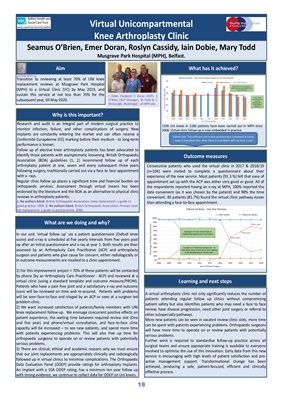
Virtual Unicompartmental
Knee Arthroplasty Clinic
Seamus O'Brien, Emer Doran, Roslyn Cassidy, Iain Dobie, Mary Todd
Musgrave Park Hospital (MPH), Belfast.
Research and audit is an integral part of modern surgical practice to
monitor infection, failure, and other complications of surgery. New
implants are constantly entering the market and can often receive a
Conformitè Europëenne (CE) marking before their medium - to long-term
performance is known.
Follow up of elective knee arthroplasty patients has been advocated to
identify those patients with asymptomatic loosening. British Orthopaedic
Association (BOA) guidelines (1, 2) recommend follow up of each
arthroplasty patient at one, seven and every subsequent three years
following surgery, traditionally carried out via a face to face appointment
with x- rays.
Regular clinic follow up places a significant time and financial burden on
orthopaedic services. Assessment through virtual means has been
endorsed by the literature and the BOA as an alternative to physical clinic
reviews in arthroplasty patients.
1. No authors listed. British Orthopaedic Association: knee replacement: a guide to
good practice. 1999. 2. No authors listed. British Orthopaedic Association. Primary total
hip replacement: a guide to good practice. 2006.
A virtual arthroplasty clinic not only significantly reduces the number of
patients attending regular follow up clinics without compromising
patient safety but also identifies patients who may need a face to face
review, have disease progression, need other joint surgery or referral to
other subspecialty pathways.
More new patients can be seen in vacated review clinic slots, more time
can be spent with patients experiencing problems. Orthopaedic surgeons
will have more time to operate on or review patients with potentially
serious problems.
Further work is required to standardise follow-up practice across all
surgical teams and ensure appropriate training is available to everyone
involved to optimise the use of this innovation. Early data from this new
service is encouraging with high levels of patient satisfaction and proactive
management support. Transformational change has been
achieved, producing a safe, patient-focused, efficient and clinically
effective process.
Why is this important?
Outcome measures
Learning and next steps
Aim
Transition to reviewing at least 70% of UNI knee
replacement reviews at Musgrave Park Hospital
(MPH) to a Virtual Clinic (VC) by May 2019, and
sustain this service at not less than 70% for the
subsequent year, till May 2020.
What has it achieved?
What are we doing and why?
INSERT
Team
photo
In our unit 'virtual follow up' via a patient questionnaire (Oxford knee
score) and x-ray is scheduled at five yearly intervals from five years post
op after an initial questionnaire and x-ray at year 1. Both results are then
assessed by an Arthroplasty Care Practitioner (ACP) and arthroplasty
surgeon and patients who give cause for concern, either radiologically or
in outcome measurements are recalled to a clinic appointment.
1) For this improvement project > 70% of these patients will be contacted
by phone (by an Arthroplasty Care Practitioner - ACP) and reviewed at a
virtual clinic (using a standard template and outcome measure/PROM).
Patients who have a pain free joint and a satisfactory x-ray and outcome
score will be reviewed on time and re-assured. Patients with problems
will be seen face-to-face and triaged by an ACP or seen at a surgeon led
problem clinic.
2) We want increased satisfaction of patients/family members with UNI
knee replacement follow-up. We envisage concurrent positive effects on
patient experience, the waiting time between required review slot (One
and five year) and phone/virtual consultation, and face-to-face clinic
capacity will be increased - to see new patients, and spend more time
with patients experiencing problems. This will also free up time for
orthopaedic surgeons to operate on or review patients with potentially
serious problems.
3) There are clinical, ethical and academic reasons why we must ensure
that our joint replacements are appropriately clinically and radiologically
followed up in virtual clinics to minimise complications. The Orthopaedic
Data Evaluation Panel (ODEP) provide ratings for arthroplasty implants.
An implant with a 10A ODEP rating, has a minimum ten year follow up
with strong evidence, we continue to collect data for ODEP on Uni knees.
I Dobie (Surgeon) E Doran (ACP), S
O'Brien (ACP Manager), M Todd & C
McGonigle, (Radiology) - all MPH site.
Consecutive patients who used the virtual clinic in 2017 & 2018/19
(n=104) were invited to complete a questionnaire about their
experience of the new service. Most patients (91.3 %) felt that ease of
appointment set up with the ACP was either very good or good. All of
the respondents reported having an x-ray at MPH, 100% reported the
date convenient (as it was chosen by the patient) and 98% the time
convenient. 85 patients (81.7%) found the virtual clinic pathway easier
than attending a face-to-face appointment.
Uni knee AP X-ray.
1336 Uni knees in 1186 patients have been carried out in MPH since
2008. Virtual clinic follow-up is now embedded in practice.
Patient said ''Very efficient and review questionnaire completed at home
- saves a consultant time when there is no problem with my knee x-rays''
18